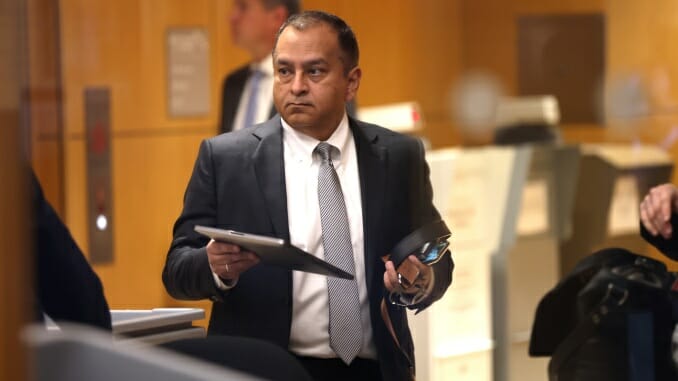As Former Theranos COO Sunny Balwani’s Trial Nears, Another Chance To Correctly Frame Theranos’ Story Emerges
Image via Justin Sullivan/Getty Images Tech Features Theranos
The Theranos saga continues to be the cautionary Silicon Valley tale that can’t write its final chapter. Founder Elizabeth Holmes’ conviction on charges that she defrauded the tech healthcare startup’s investors may represent the end of Theranos’ now 13-year ordeal to some, but there are still a number of splinters to dig out to truly put this story to bed.
One of those remnants, ex-Theranos president and COO Sunny Balwani, was set to get his trial on the same charges against Holmes underway on Wednesday, years after the company’s ruse was exposed. But that didn’t happen. The same Santa Clara County courtroom where Holmes finally faced legal consequences for her actions was emptied after a juror reported a possible COVID-19 exposure. Once again, Balwani’s legal reckoning was delayed.
Obviously, the potential for Balwani’s trial to be a superspreader event is grounds for pushing things down the line a bit, but another delay also somehow plays into the growing mystique and fervor around the case. A company with the long list of missteps and crimes racked up by Theranos deserves to live on in the mind as Silicon Valley and startup culture remain ever-present. It speaks to a disconnected and skewed view of how a culture unique to tech circles impacts those beyond its walls that has emerged from countless startups.
But that also comes with the kind of cult of personality present during Holmes’ trial. It’s highly unlikely that Balwani will enter the courtroom with people dressed like him and holding signs proclaiming his innocence similar to how Holmes doppelgangers hovered outside the courthouse. Holmes’ allegations of abuse against Balwani during the romantic relationship that ran parallel to their reign atop the fake blood droplet pipedream factor heavily into that, as well as the potential for Holmes to testify against him in an effort to reduce her sentence.
Balwani is the villain in the courtroom narrative, whether Holmes maintains hero status in your mind or not. Yet that narrative isn’t exclusive to one room in San Jose. Years of telling and retelling the downfall of Theranos and the folly of its executives’ hubris morphed at some point from an examination of Silicon Valley philosophy into an entertainment product. It lives in an annex to the general obsession with true crime stories, propping up its villains and their practices as subjects to be studied with incredible intimacy.
Learning and grasping for some level of understanding as to why actions occur and what larger circumstances played into those decisions is a worthy cause, but it takes careful attention to keep that analytical eye in place. If it darts, influence can shift and focus can be lost on the questions at hand. The framing of Balwani v. Holmes that is currently dominating the conversation around Balwani’s case is already doing that.
It’s easy to get swept up by strong personalities with the inner workings present in Balwani and Holmes’ relationship, especially as they are being dramatized in Hulu’s The Dropout alongside actual legal proceedings. That pull must be resisted or else the story of Theranos will once again marginalize the people impacted most by the duo’s actions: the patients.
Holmes’ trial did just that both in practice (only two patients gave testimony) and in the structure of the judicial system (proving the defrauding of investors is much easier than doing the same for patients). That isn’t likely to change during Balwani’s trial. As the tale of Theranos inches toward a likely stopping point, we need to rethink how its characters are positioned. Or rather, remind ourselves that Holmes, Balwani, Theranos employees, whistleblowers and patients aren’t characters at all.